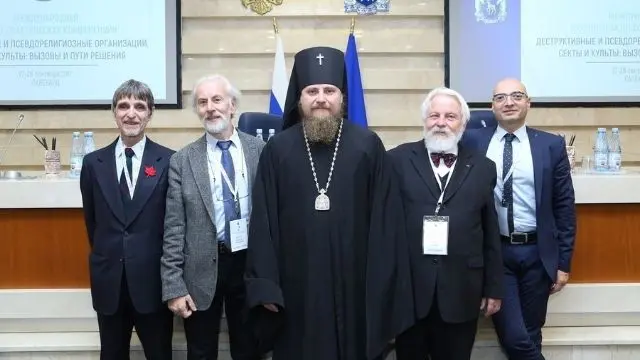The international conference “The Mission and the Orthodox Church” ended in Volos, bringing together Orthodox theologians from all over the world who discussed theological and current problems of church life in dozens of sections. One of the topics generating the most interest was “War and Peace”, with its focus on the “Russian world” doctrine, which is currently the main ideology of Russia’s war against Ukraine. Already at the beginning of the Russian invasion of the neighboring country, the Academy of Theological Studies in Volos formulated several theses about the nature of this ideology, which became extremely popular in Orthodox circles (see here and here). In this theological text, the “Russian world” is defined as a heresy based on ethnophiletism. The discussion on the issue of whether it is also the doctrine of the Russian world or is it a political ideology has been going on for several months. At the graduate theological forum in Volos, the report of Archimandrite Cyril (Govorun), whose point of view can be summarized in the following few points. Specifically, he claims:
“1. If by heresy we mean the Trinitarian or Christological heresies discussed between the fourth and seventh centuries, then the “Russian world” could not qualify as a heresy. However, if we go back to the time of St. Irenaeus of Lyons, when Christianity was confronted by the hostile pagan Greco-Roman world, we can draw some parallels with the teaching of the “Russian world.”
In my opinion, both worlds are dualistic and based on coercion and a mixture of religion and politics. These features are embodied in the religious currents that the martyr Irenaeus and his companions defined as heresies. I think that the doctrine of the “Russian world” can be approached in the same spirit.
It is dualistic because, like the ancient dualistic Manichaeism or Montanism, it sees the world as ontologically polarized—between the “Godless West” and “Holy Russia.” It is based on coercion that has reached unprecedented bloody proportions. Finally, we witness the politicization of religion in Russia to a degree comparable to the period from Augustus to Diocletian. It may well be called a political religion, as the pagan imperial religion was in the age before Constantine.
St. Irenaeus and his associates saw heresies as forms of pagan thought disguised as Christianity. I would interpret the “Russian world” in a similar way.
2. Almost all local Orthodox churches are subjected to ethnophiletism – each to its own degree. It would be unfair to accuse only the Russian Orthodox Church of ethnophiletism. At the same time, the Russian Orthodox Church demonstrated an unprecedented degree of ethnophiletism. Even the Balkan wars at the beginning of the 20th century are less ethnophiletic because they are less cruel and bloody than the Russian war in Ukraine.
I think it is more correct to call the “Russian world” not ethnophyletic, but phyletic doctrine. The “Russian world” claims to be above ethnic boundaries. Essentially, he states that the Russian-speaking ethnicities (ἔθνη) in Eastern Europe and even in Central Asia constitute one “people” – a word that can be translated by the Greek race. Therefore, the Russian world can and should be accused not so much of ethnophyleticism as of violent phyleticism, the emphasis being on “violent.”
3. The Council of Crete of 2016 called Philetism a “church heresy”. I find this adjective promising in the interpretation of the “Russian world” doctrine. The “Russian world” has its own ecclesiology, and it is twisted. It is in such ecclesiology that the ROC found justification not to go to the island of Crete in 2016, later to unilaterally sever relations with other churches, as well as to deploy non-canonical activities in Africa. The way in which the Russian Orthodox Church and the Ukrainian Orthodox Church of the Moscow Patriarchate treat the Orthodox Church of Ukraine is another proof of a distorted church consciousness. It has come to the point that the ROC and the UOC-MP are ready to rechristen the members of the OCU, which, it must be reminded, is in full communion with at least some of the local Orthodox churches, including the Ecumenical Patriarchate.
The distorted ecclesiology, which is the basis of the ideology of the Russian world, is characterized by a number of reductionisms. The universal church, if viewed through the prism of the “Russian world”, is practically reduced to one local church – the Moscow Patriarchate. In this case, the statement “I believe in one, holy, conciliar and apostolic church of the Moscow Patriarchate” is not anecdotal, but quite convincing. It is these distorted ecclesiological views that are the cause of the fear that prevents many members of the UOC from joining the OCU.
4. Finally, let me use the distinction I made in my earlier ecclesiological studies. In the case of the Russian Church, we are dealing with an extreme case of replacing the nature of the Church with its administrative structures. As a result, the Russian Church turned out to be silent about the war in Ukraine. Or rather, only her administration is allowed to speak about the war, and these are words of unequivocal support. The voice of the entire church has been reduced to the pro-war pronouncements of its administrative apparatus.
5. As a conclusion: all heresies are primarily a reductionism of Orthodoxy. The “Russian world” has created an ecclesiology that is such reductionism. It is therefore quite similar to an ecclesiastical heresy.’
Illustrative photo: Saint Louis King of France and a page (El Greco)






